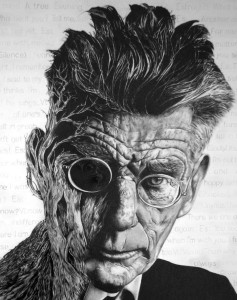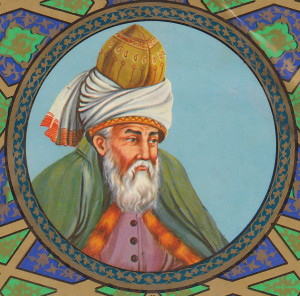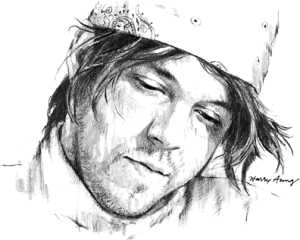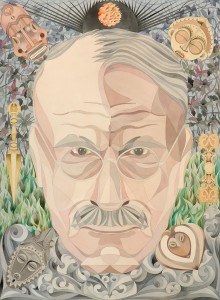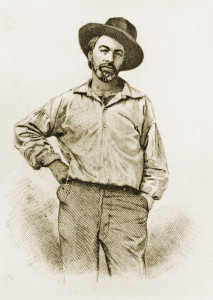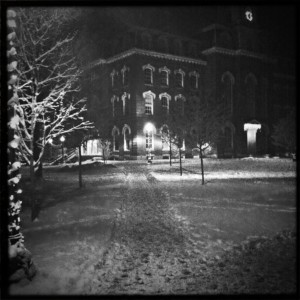
The Vermont College of Fine Arts Alumni Magazine asked me to contribute an article about “Life after the MFA” for its Winter 2014 issue. As graduation season approaches, I’d like to share these words of encouragement and strategies for coping with writers and artists everywhere who may be facing difficult transitions. Do let me know what you think.
 Like the fool in the Tarot, when we leave graduate school we’re all potentiality, accompanied solely by our trustworthy dog, our instincts. As an inner quest, it’s a solitary journey, but one that outwardly propels us to seek a balance between engagement with others and communion with our private souls. To paraphrase John Updike: Writers are cave-dwellers who want to be chased into the cave. Most of us in the arts welcome interiority, but not to the exclusion of interaction and attention.
Like the fool in the Tarot, when we leave graduate school we’re all potentiality, accompanied solely by our trustworthy dog, our instincts. As an inner quest, it’s a solitary journey, but one that outwardly propels us to seek a balance between engagement with others and communion with our private souls. To paraphrase John Updike: Writers are cave-dwellers who want to be chased into the cave. Most of us in the arts welcome interiority, but not to the exclusion of interaction and attention.
Probably it’s an exaggeration to think of leaving the MFA fold as exile—graduation is a ritual of transition not an enforced condition—but let’s face it, once we depart the walled villa of graduate school, its significant mentors and tribes of friends, we’ve changed. I’m talking about often radical transformation, shifts in perception, self-awareness, altered habits of speech and thought—subtle and wrenching metamorphoses.
A funny image comes to mind. Remember Lon Chaney in the Wolf Man movies? Remember how his forehead would begin to bulge and fur crept up his neck? Remember the horrifying spectacle of watching him watch himself become a beast? Let’s just play with the idea that VCFA grad school has the opposite, civilizing effect.
Or let’s say we’re initiates undergoing a rite of passage—we’re being scarified, tattooed, sent to the moon hut, learning to decode the stars. The purpose is to move us to the next stage of development. The transition is luminal but time-bound: for ten days we’re severed from the known world. Our preconceptions about ourselves, our work, the meaning of work are morphing. Soon we’ll be bestowed adult membership in the clan. We’ll carry on the tradition. We’re the seeds, the fruit.
 The British psychiatrist Anthony Storr suggests that when a break with the past is imminent and issues of identity, belonging, and continuity arise—while the furniture in our psyche is being rearranged—patience, retreat, and reflection are required. Simply put, don’t rush to the surface of your life without expecting to get the bends. If art is an act of incarnation so is the evolution of an artist.
The British psychiatrist Anthony Storr suggests that when a break with the past is imminent and issues of identity, belonging, and continuity arise—while the furniture in our psyche is being rearranged—patience, retreat, and reflection are required. Simply put, don’t rush to the surface of your life without expecting to get the bends. If art is an act of incarnation so is the evolution of an artist.
On the other hand, when it’s time to leave campus as graduates, we’re beset by homesickness and anxiety. It’s been a big experience. Without the structure of a residency, without assignments, deadlines, or the goal of attaining a degree, how will we manage to keep our public/domestic lives from usurping or artistic space? We’re lonely for the old life, our teachers and our cohorts. Where will we now find community? Inspiration and support?
In-post-MFA life we’re a scattered lot. But we belong to a history we carry as part of our identity, a place inside ourselves, a refuge we can return to again and again when our creativity feels in jeopardy. Recently I emailed my friend and dharma teacher Cheri Maples, co-founder of the Center for Mindfulness & Justice, about the Buddhist notion of sangha and taking refuge.  Cheri, ordained by Zen Master Thich Nhat Hanh, whom she calls “Thay,” replied: “Thay speaks of sangha at a cellular level (the sangha body), which is totally interrelated to refuge . . . when we’re together as a practice community (sangha), we rest in common shared values, and then when we go outside, we’re the living embodiment of that community (we’re a cell representing that body, reflecting those value and commitments of that body). We return to the sangha/community for refuge, to rest and replenish ourselves. We know we create something together as a sangh that no one can create individually.”
Cheri, ordained by Zen Master Thich Nhat Hanh, whom she calls “Thay,” replied: “Thay speaks of sangha at a cellular level (the sangha body), which is totally interrelated to refuge . . . when we’re together as a practice community (sangha), we rest in common shared values, and then when we go outside, we’re the living embodiment of that community (we’re a cell representing that body, reflecting those value and commitments of that body). We return to the sangha/community for refuge, to rest and replenish ourselves. We know we create something together as a sangh that no one can create individually.”
We’re a cell representing that body, reflecting those values. . . . This is the perfect image of how I think of post-MFA life. We take refuge in the teaching we’ve absorbed, in our creative selves, and in the good company of others. When we need support, we find each other. We return to campus for retreats. We’re never without sources or resources. We continue together as sangha, as vital cells of a living whole.


